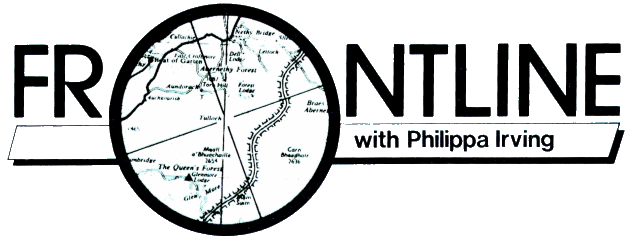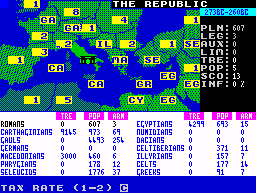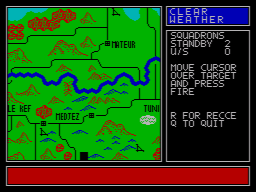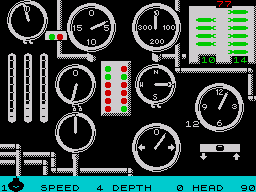


Spectrum soldiers can found the Roman Empire, defeat the Germans and Japanese or simply fade away — here’s a guide to strategy games for all those Christmas days indoors
IT IS unfortunately true that computer games have a limited shelf life. One software manufacturer compared them to pop singles; unless a new title takes off immediately, it has little chance of succeeding in the longer term. After several months of development, thought and work, a game has roughly ten days in the shops to prove its commercial worth. Even games which do sell don’t stay on sale for very long these days, and can turn up in compilations a surprisingly short time later.
The fortunate exception to this seems to be the wargame, at least once the initial hurdle of ‘sell fast or go under’ has been passed. Wargames sell more slowly than games in more mainstream genres, and can be found in the shops six months after they’ve been released. Perhaps players get bored with an arcade game within two days, and rush out to buy a new one soon after; it takes a wargamer rather longer to make the most of his purchase.
So in the run-up to Christmas, when you might be thinking about requesting some release of the past year for your stocking — or even buying one for someone else, perhaps to initiate them into the delights of thinking games — let’s take a look back at some of the more interesting games of the year. With luck (and a good retailer) you can find any of them.
1987 has hardly been a vintage year for Spectrum strategy games, but at least there’s been a steady trickle — till the last couple of months. anyway!

PSS’s Annals Of Rome: play for centuries, if you’ve got the empire-building skills
The game which kept me playing throughout last Christmas holiday is PSS’s rather unusual Annals Of Rome (85% in Issue 38; by Rome Software; £12.95). The player is presented with a map of Europe divided roughly as it was in the year 273 BC, and you have to build the Roman Empire, starting off with the modest state of Italia. By conquering the neighbouring states, the empire grows, and at the climax of the game all of mainland Europe and further afield are under Roman rule.
But stability is never achieved. Sporadic rebellions result in the Romans being thrown out. You can appoint senators as generals. governors or dictators, but their loyalty cannot be taken for granted, and they themselves may lead a rebellion against Rome and seize power.
Annals Of Rome continues indefinitely, with new waves of powerful barbarians arriving at roughly the correct historical intervals, till the empire collapses. Theoretically you could keep the Roman Empire going into the 20th century and beyond, but I never even managed to survive into the first century AD. The game is addictive and absorbing, though its presentation is amateurish and the Spectrum version (converted from the Amstrad) has a number of amusing and entertaining bugs.
CCS’s Yankee (87% in Issue 42; £9.95) is by K Wright, the author of CCS’s Napoleon At War. It’s a battle simulation, allowing the player to direct individual corps on the field of two battles, Gettysburg and Chickamauga, in the American Civil War. It’s different from other wargames in that you can give orders to the corps commander (rather than the corps itself) and then watch the units get themselves into a mess. The resulting uncertainty is interesting; you can never be quite sure where a unit is going to end up, and combat takes place on contact with the enemy.
The game moves swiftly and smoothly, and the battles are different enough in feel to both be worthwhile. Yankee is one of the best battle simulations around, and another good buy for those who like straightforward wargames. It also has an inlay illustration by CRASH’s cover artist Oli Frey!

CCS’s Vulcan: campaign of the year
Probably the major game of the year was CCS’s Vulcan (94% Overall in Issue 39: by R T Smith; £9.95). Vulcan is a simulation of one of the less well-known campaigns of the Second World War, the attempt by the Allies to free Algeria, Morocco and Tunisia from German occupation. There are four scenarios (five in the 128K version) which take place across a very large map of the area.
According to the rulebook, it would take an enthusiastic player 45 hours to play all the scenarios and run the campaign from both sides! Play centres on the capture of cities, as it usually does in wargames covering campaigns this large. With five positive orders, seven descriptive parameters, air attacks, varied terrain, seven types of unit and complex supply rules, there’s plenty of scope for interest and subtlety. Vulcan will certainly keep you playing throughout the Christmas holidays, and I recommend it.

Microprose’s submarine simulation Silent Service: ruling the waves where it can
MicroProse’s Silent Service (80% in Issue 38: by Sid Meier; £9.95) is a submarine simulation set in the American World War II campaign against Japanese convoys. You can choose to go straight into actual combat, or to take the open-ended scenario which involves roving the sea, searching for Japanese convoys and sinking them.
There are several models of submarine built into the program, matching to the modifications that were added to the design of submarines in the course of the war, and you can adjust the difficulty level by selecting whether or not to have realistic handicaps like the occasional dud torpedo or limited visibility. A lot of thought went into Silent Service; it is slightly austere, but the technical detail adds interest. This is another worthwhile wargame which will keep you going for a long time.
Remember when Silent Service was banned from most West German shops for being ‘too realistic’ a simulation, as CRASH reported in Issue 41? Well, MicroProse’s fighter-plane simulation F-15 Strike Eagle (84% in Issue 42, and also by Sid Meier) was on the German government’s list of games which it wanted to ban, too — but the software house won an appeal case in October and got F-15 Strike Eagle taken off the list. However, Silent Service is still out of official favour.
Some less exciting releases are worthy of brief mention. I found Lothlorien’s Dark Empire (just 60% in Issue 43: £9.95) very nerve-racking to play, but it’s well-produced with a fierce addictiveness. CRL’s Samurai (69% in Issue 39: by Colin Ajayi-Obe of Ninja Hamster notoriety: £9.95) is simplistic but enjoyable all the same: it might be a good choice for a younger player inexperienced in strategy. And PSS’s compilation Conflicts 1 (covered in Issue 42; £12.95) contains one reasonable game (Battle Of Britain, 82% in Issue 37), one bad game (Falklands ’82 by John Bethel — 33% in Issue 27) and one pretty good golden oldie (Theatre Europe by Alan Steel — 84% in Issue 30), so it’s not bad value as a stocking-filler.
For the record, the two games I have liked least this year are PSS’s Battlefield Germany (42% in Issue 40; by Cybercon Enterprises; £12.95) and Lothlorien’s Roundheads (59% in Issue 45; £9.95). I’ve been exasperated by the general shoddiness of a lot of releases, and, on a deeper level, the lack of attention paid to the need for an involving and interesting game. It can be done, even on the diskless Spectrum. Let’s hope things will be better next year.